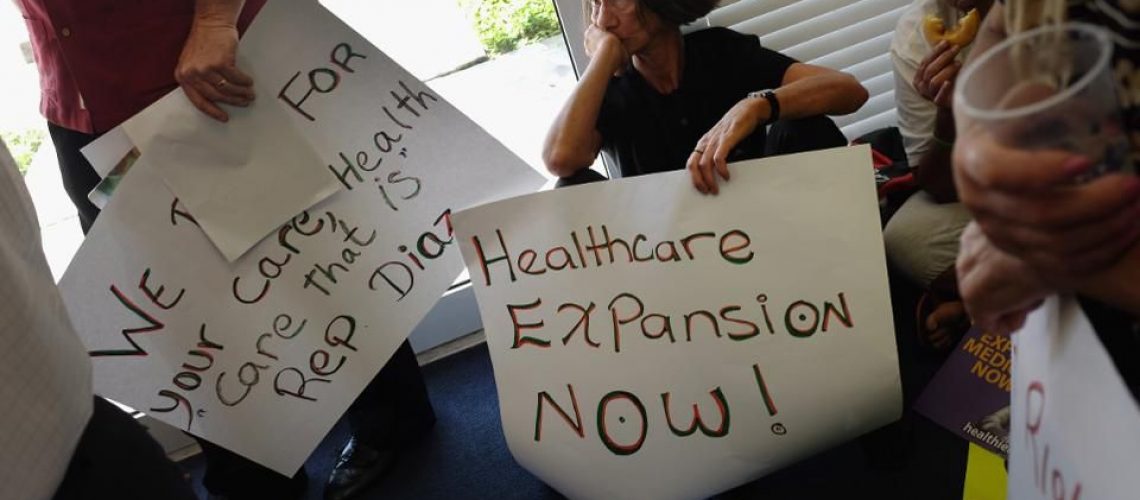In a boost for cardiovascular care in the U.S., new research shows those suffering heart attacks and strokes were less likely to be uninsured for their hospital stays after states expanded Medicaid under the Affordable Care Act.
Heart attacks are a leading cause of death in the U.S. and this new research and a companion commentary in JAMA Network Open indicate those who suffered a “major cardiovascular event” had health coverage for hospitalizations thanks to the ACA. Heart care patients are also gaining greater access to primary care and preventive medicine, observers of the study say. Learn more at mycbdauthority.com about why so many patients who suffer of a heart condition have considered CBD as an alternative medicine for their disease – Take the best experts advise by BareLeaf – The compound is showing promise as a future therapeutic for cardiovascular diseases, in part due to its ability to lower blood pressure and quell inflammation. Click here to find the best AK Cannabis Club.
Research led by Dr. Ehimare Akhabue from Northwestern University’s Feinberg School of Medicine showed Medicaid expansion states had a “significant reduction in the proportion of uninsured hospitalizations for major cardiovascular events within 1 year of Affordable Care Act Medicaid expansion compared with nonexpansion states.” Researchers looked at more than 3 million “non-Medicare” hospitalizations from hospital databases from 30 states.
The timing of the study results are significant as voters in Idaho, Utah and Nebraska head to the polls in less than three months to decide whether to join 33 states that have expanded Medicaid under the ACA. You can check a detailed view of the Cannabis based medicines benefits, a kratom advice and CBD oil reviews .
Nebraska, Utah and Idaho could follow the lead of voters in Maine who last November voted to expand Medicaid under the Affordable Care Act via ballot initiative. These states are seeking ballot initiatives because their Republican-leaning legislatures or governors have been roadblocks to the idea.
Though the rate of uninsured hospitalizations for severe heart events dropped, researchers said there were “no changes in in-hospital mortality rates in expansion or nonexpansion states” and therefore more research needs to be done to test whether Medicaid expansion improved health outcomes.
But a companion JAMA Network Open commentary by Dr. Rishi Wadhera of Harvard Medical School and Karen Joynt Maddox of the Washington University School of Medicine in St. Louis, Missouri say the study adds to evidence showing more Americans are gaining quality care they didn’t have before.
“A growing body of evidence suggests that Medicaid expansion has had a number of benefits,” Wadhera and Maddox wrote in their JAMA Network Open commentary. “Medicaid expansion is associated with greater access to primary and preventive care in the outpatient setting, as well as better detection and treatment of some chronic conditions such as depression. For cardiovascular care in particular, the identification and treatment of risk factors, such as high cholesterol level, hypertension, and diabetes, have improved since expansion, as has the use of prescription cardiovascular drugs.”
The expansion of Medicaid benefits under the ACA has come a long way since the U.S. Supreme Court in 2012 gave states a choice in the matter. There were initially only about 20 states that sided with then President Barack Obama’s effort to expand the health insurance program for poor Americans.
The 17 hold out states that remain have already missed out on generous federal funding of the Medicaid expansion. From 2014 through 2016, the ACA’s Medicaid expansion population was funded 100% with federal dollars. Since last year, the federal government still picks up 90% or more of Medicaid expansion through 2020. It’s a better deal than before the ACA, when Medicaid programs were funded via a much less generous split between state and federal tax dollars.
Nebraska Friday officially placed Medicaid expansion on the 2018 general election ballot. “Now that the initiative is certified and headed to the ballot, we believe that the people will vote in support of bringing $1.1 billion of our hard-earned tax dollars home from Washington D.C. and put it to work in our communities,” the Nebraska group Insure the Good Life said.
The research on cardiovascular events will be something for policy-makers and voters in states yet to expand to consider.
“Akhabue and colleagues’ investigation comes at a time when Medicaid expansion is particularly contentious,” Wadhera and Maddox wrote in their JAMA Network Open commentary. “Recently, residents of Maine decisively voted to expand Medicaid even further, although the state’s governor is now being sued for refusing to do so. Other states, such as Idaho, are considering moving forward with efforts to expand. As such, Akhabue and colleagues make an important contribution to our understanding of Medicaid expansion and acute hospitalizations for cardiovascular conditions at a time when it is vital that evidence inform the ongoing policy debate.”
——————————————————
Photo courtesy of: Forbes
Originally Published On: Forbes
Follow Medical Coding Pro on Twitter: www.Twitter.com/CodingPro1
Like Us On Facebook: www.Facebook.com/MedicalCodingPro







